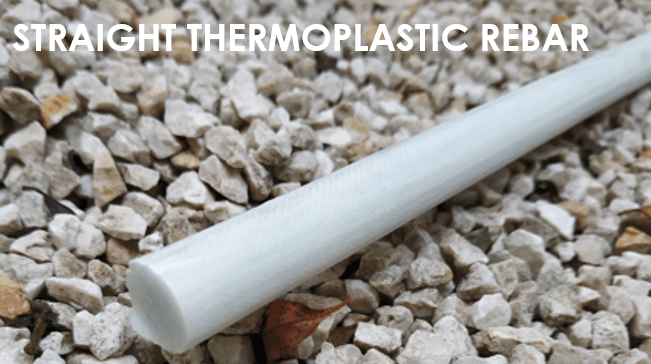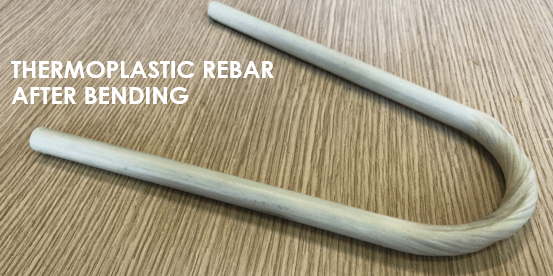New thermoplastic composite (FRP) Rebars for civil construction
We have developped thermoplastic Fiber Reinforced Plastic (FRP) Rebars made of a new resin which is compatible with the standard pultrusion composite process. This resin enables the production of high-performance fiber reinforced profiles with the unique possibility to bend straight rebars directly at the construction site.


Benefits
- New composite rebars with high fibers content, lightweight and anti-corrosive
- Bendable composites rebars able to be customised directly on construction site
- Flexible and economical supply chain
Issue
Today, in the construction sector, 2 types of rebars are being used: steel rebars and composite rebars. Steel rebars are widely used to reinforce concrete structures, whereas composite rebars are often a technically and economically interesting alternative for speciality civil engineering buildings in severe conditions of use.
Current steel and composite rebars imply 2 major drawbacks:
1) Steel Rebars are sensitive to corrosion, which increases maintenance costs and can reduce the lifespan of structures.
2) Composites Rebars have to be bent at a manufacturing site which leads to a lack of flexibility logisitic-wise at the construction site.
Currently, the use of thermoset composites makes bending complex. Unlike steel reinforcements that are bent on site, the bending of composite rebars must generally be carried out in the factory, before the irreversible hardening of the resin. The sets of straight and bent rebars are then shipped to the construction site.
This procedure leads to a lack of flexibility in case of modification of the initial plans of a building site.
Solution
We have developed a thermoplastic resin specifically for manufacturing composite rebars, which will enable them to be bent directly at the construction site.
This thermoplastic resin has the particularity of being liquid at room temperature before initial processing, allowing the production of highly reinforced profiles with very high fibre content. It is perfectly adapted to the pultrusion process, without modifying the production of composite rebars.
Bending Technology
The bending process consists of heating the rebar up to 200°C, enabling it to be easily bent. Then, after a subsequent cooling step, it will regain rigidity.
Benefits
The use of a thermoplastic resin has several major positive impacts.
Supply chain:
- Bend rebars, at any time, during the construction
- Save costs by simplifying the supply chain for composite rebars
- Improvement of waste management of composite rebars by avoiding the loss/waste of rebars
Technical:
- Compatible with current thermoset pultrusion process
- Light and highly resistant to corrosion
- The final thermoplastic rebars meet all the technical requirements of the latest ASTM D7957 standards